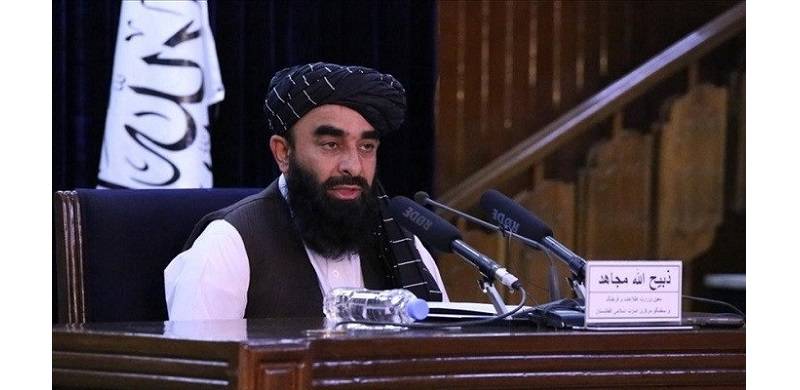
Daesh militants involved in an attack on the Pakistan embassy in Kabul have been killed, Afghan Taliban announced on Thursday.
On Dec 2, the embassy in the Afghan capital came under an attack as terrorists targeted Chargé d’Affaires (CdA) to Afghanistan Ubaidur Rehman Nizamani targeted, critically wounding his guard.
The outlawed Islamic State's Khorasan chapter (IS-K) had claimed responsibility for the attack targeting the Pakistani diplomat.
In his statement, spokesperson Zabiullah Mujahid said the forces carried out operations in Kabul against a network of the Islamic State group involved in attacks on Pakistani embassy and on a hotel where Chinese nationals were staying.
The Foreign Office had earlier said that it was in contact with the Afghan authorities, expressing hope that the perpetrators of the incident would be brought to justice.
It was reported on Jan 5 that Pakistan would approach the Taliban’s interim Afghan government with a fresh demand to deny Tehreek-e-Taliban Pakistan (TTP) and its affiliates any freedom to operate on Afghan soil.
While Pakistan’s civil and military leadership has decided to deal sternly with TTP and other terror outfits, the Afghan Taliban will be “asked to cooperate in this endeavor”.
There has been a sharp surge in terrorist attacks across Pakistan in recent months. TTP claimed responsibility for more than 140 terrorist attacks in the last three months, including the first suicide bombing attack in Islamabad in nearly eight years. TTP also claimed to have carried out more than 300 attacks during 2022.
The resurgence of TTP has forced the country’s senior policymakers to revisit the “strategic depth” strategy pursued by previous administrations. The high-powered National Security Committee (NSC) recently held prolonged discussions on the issue, and approved a new approach to this challenge.
Pakistan’s top civil and military leadership has also decided not to pursue talks with the TTP, and this would be conveyed to the Afghan Taliban. However, while speaking to the media, interior minister Rana Sanaullah said that options to “bring TTP back to the negotiating table” were still being explored.
The Afghan Taliban acted as mediators in the Pakistan-TTP negotiations since October 2021, but the Taliban’s interim Afghan government refused to evict TTP by force or effectively restrain the terror group’s activities.
On Dec 2, the embassy in the Afghan capital came under an attack as terrorists targeted Chargé d’Affaires (CdA) to Afghanistan Ubaidur Rehman Nizamani targeted, critically wounding his guard.
The outlawed Islamic State's Khorasan chapter (IS-K) had claimed responsibility for the attack targeting the Pakistani diplomat.
In his statement, spokesperson Zabiullah Mujahid said the forces carried out operations in Kabul against a network of the Islamic State group involved in attacks on Pakistani embassy and on a hotel where Chinese nationals were staying.
The Foreign Office had earlier said that it was in contact with the Afghan authorities, expressing hope that the perpetrators of the incident would be brought to justice.
It was reported on Jan 5 that Pakistan would approach the Taliban’s interim Afghan government with a fresh demand to deny Tehreek-e-Taliban Pakistan (TTP) and its affiliates any freedom to operate on Afghan soil.
While Pakistan’s civil and military leadership has decided to deal sternly with TTP and other terror outfits, the Afghan Taliban will be “asked to cooperate in this endeavor”.
There has been a sharp surge in terrorist attacks across Pakistan in recent months. TTP claimed responsibility for more than 140 terrorist attacks in the last three months, including the first suicide bombing attack in Islamabad in nearly eight years. TTP also claimed to have carried out more than 300 attacks during 2022.
The resurgence of TTP has forced the country’s senior policymakers to revisit the “strategic depth” strategy pursued by previous administrations. The high-powered National Security Committee (NSC) recently held prolonged discussions on the issue, and approved a new approach to this challenge.
Pakistan’s top civil and military leadership has also decided not to pursue talks with the TTP, and this would be conveyed to the Afghan Taliban. However, while speaking to the media, interior minister Rana Sanaullah said that options to “bring TTP back to the negotiating table” were still being explored.
The Afghan Taliban acted as mediators in the Pakistan-TTP negotiations since October 2021, but the Taliban’s interim Afghan government refused to evict TTP by force or effectively restrain the terror group’s activities.

